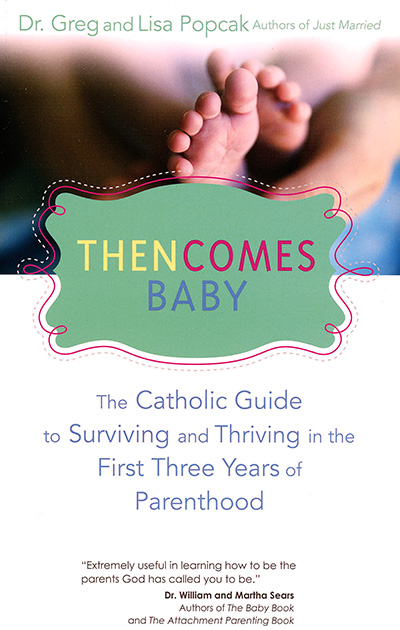Reviewed by Regina Lordan
“Then Comes Baby: The Catholic Guide to Surviving and Thriving in the First Three Years of Parenthood” by Greg and Lisa Popcak. Ava Maria Press (Notre Dame, Indiana, 2014). 272 pp., $16.95.
Tired and sensitive pregnant mothers and new parents beware. “Then Comes Baby: The Catholic Guide to Surviving and Thriving in the First Three Years of Parenthood” is no exception to the lot within the genre of parenting books. There will be a few points of contention amid the advice that Greg and Lisa Popcak extoll. And if you are the type of parent who has to work outside the home shortly after having the baby, cannot nurse the baby and prefers for said baby to sleep in a crib rather than in your own bed, parts of this book might irk you.
But if you are the type of parent who is open to different points of view on parenting (or can skip right past them) and are looking for a perspective that is inspired by Catholic ideas, then this book will provide helpful insight into how to raise a happy baby as happy parents.
Greg Popcak is an author, radio and TV show host, and professor of sociology and graduate theology. He and his wife are directors of the Pastoral Solutions Institute, which integrates Catholic teaching with counseling psychology. In addition to co-hosting shows with her husband, Lisa is also an author, speaker, family-life coach and lactation consultant. Their professional and personal lives help shape the book with a mix of personal anecdotal experience and research-based parenting suggestions.
Generally speaking, parenting books fall into two camps: Baby’s happiness at the initial expense of Mom and Dad’s happiness or Mom and Dad’s happiness at the initial expense of Baby’s. But this book, according to the authors, is based on the principle of the common good: “Those that have the least ability to meet their own needs … have the right to have their needs met first.” So Mom and Dad get a chance to take care of themselves and each other, but in due time.
Following from this concept, the authors suggest that parents need to encourage a strong bonding process with “extravagant” affection and attention for the baby, which includes nursing on demand, co-sleeping and not leaving the baby even for an hour or so during the first few months after birth. This is called self-donation, “using everything we have for the good of others.” This is a tall order for many parents, but the results are a joyful and loving family, the authors suggest.
The Popcaks truly revere the role of parenthood and cannot stress its importance enough. They also insist that it is OK to feel challenged but equally OK to feel happy and confident as a parent. Too often parents share horror stories with each other without being proud of proper self-care and keeping it together.
In the book, parents are offered wonderful ideas on how to introduce prayer into a baby’s everyday life and routine, how to pick strong godparents and how to even take a baby to church without totally losing it. Parents also are given suggestions on how to gently and mercifully discipline toddlers with repositioning, redirecting and re-regulating.
These tips and more may be particularly helpful for parents who are seeking constructive, tangible advice on how to raise a baby in a Catholic home. So, if you can get through the touchy stuff that fuels the fire of many a “mommy war,” then go ahead and enjoy this newest addition to Catholic parenting books.
(Lordan, a mother of two, has master’s degrees in education and political science and is a former assistant international editor of Catholic News Service.)
(Copyright © 2015 Catholic News Service/United States Conference of Catholic Bishops. The CNS news services may not be published, broadcast, rewritten or otherwise distributed, including but not limited to, such means as framing or any other digital copying or distribution method in whole or in part, without prior written authority of Catholic News Service.)
